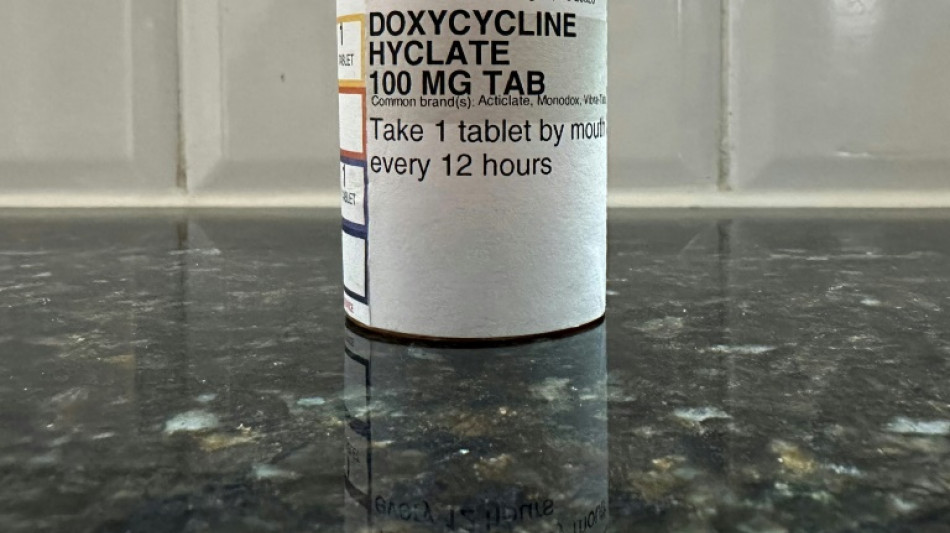
-
 Scandic Trust Group strengthens sales network with First Idea Consultant
Scandic Trust Group strengthens sales network with First Idea Consultant
-
Turmoil in tiaras at Miss Universe pageant in Thailand

-
 Probe into Thales defence group looking at Indonesian contract
Probe into Thales defence group looking at Indonesian contract
-
US to cancel flights as longest govt shutdown drags on

-
 Home in Nigeria, ex-refugees find themselves in a war zone
Home in Nigeria, ex-refugees find themselves in a war zone
-
Doncic's Lakers hold off Wembanyama's Spurs, Blazers silence Thunder

-
 For Turkey's LGBTQ community, draft law sparks existential alarm
For Turkey's LGBTQ community, draft law sparks existential alarm
-
Musk's $1 trillion pay package to face Tesla shareholder vote

-
 Tonga rugby league star out of intensive care after seizure
Tonga rugby league star out of intensive care after seizure
-
Argentine ex-president Kirchner goes on trial in new corruption case

-
 Dams, housing, pensions: Franco disinformation flourishes online
Dams, housing, pensions: Franco disinformation flourishes online
-
Endo returns as Japan look to build on Brazil win

-
 Franco captivates young Spaniards 50 years after death
Franco captivates young Spaniards 50 years after death
-
German steel industry girds for uncertain future

-
 IPL champions Bengaluru could be sold for 'as much as $2 billion'
IPL champions Bengaluru could be sold for 'as much as $2 billion'
-
Budget impasse threatens Belgium's ruling coalition

-
 New Zealand ex-top cop admits to having material showing child abuse, bestiality
New Zealand ex-top cop admits to having material showing child abuse, bestiality
-
BoE set for finely balanced pre-budget rate call

-
 Australian kingpin obtains shorter sentence over drug charge
Australian kingpin obtains shorter sentence over drug charge
-
Weatherald's unenviable Ashes task: fill giant hole at top left by Warner

-
 Ovechkin first to score 900 NHL goals as Capitals beat Blues
Ovechkin first to score 900 NHL goals as Capitals beat Blues
-
On Mexico City's streets, vendors fight to make it to World Cup

-
 Asian markets bounce from selloff as US jobs beat forecasts
Asian markets bounce from selloff as US jobs beat forecasts
-
Philippine death toll tops 140 as typhoon heads towards Vietnam

-
 Kyrgios targets 'miracle' Australian Open return after knee improves
Kyrgios targets 'miracle' Australian Open return after knee improves
-
'AI president': Trump deepfakes glorify himself, trash rivals

-
 Belgium probes drone sightings after flights halted overnight
Belgium probes drone sightings after flights halted overnight
-
Five things to know about 'forest COP' host city Belem

-
 World leaders to rally climate fight ahead of Amazon summit
World leaders to rally climate fight ahead of Amazon summit
-
Engine fell off US cargo plane before deadly crash: officials

-
 Mexican leader calls for tougher sexual harassment laws after attack
Mexican leader calls for tougher sexual harassment laws after attack
-
Meghan Markle set for big screen return: reports

-
 Japan deploys troops after wave of deadly bear attacks
Japan deploys troops after wave of deadly bear attacks
-
FIFA announce new peace prize to be awarded at World Cup draw in Washington

-
 Australia's Cummins hints at return for second Ashes Test
Australia's Cummins hints at return for second Ashes Test
-
Boeing settles with one plaintiff in 737 MAX crash trial

-
 Man City win as Inter stay perfect, Barca held in Champions League
Man City win as Inter stay perfect, Barca held in Champions League
-
French superstar DJ Snake wants new album to 'build bridges'

-
 Barca rescue draw at Club Brugge in six-goal thriller
Barca rescue draw at Club Brugge in six-goal thriller
-
Foden hits top form as Man City thrash Dortmund

-
 NBA officials brief Congress committee over gambling probe
NBA officials brief Congress committee over gambling probe
-
Inter beat Kairat Almaty to maintain Champions League perfection

-
 Newcastle sink Bilbao to extend Champions League winning run
Newcastle sink Bilbao to extend Champions League winning run
-
Wall Street stocks rebound after positive jobs data

-
 LPGA, European tour partner with Saudis for new Vegas event
LPGA, European tour partner with Saudis for new Vegas event
-
Eyes turn to space to feed power-hungry data centers

-
 Jazz lose Kessler for season with shoulder injury
Jazz lose Kessler for season with shoulder injury
-
League scoring leader Messi among MLS Best XI squad

-
 MLS bans Suarez for Miami's winner-take-all playoff match
MLS bans Suarez for Miami's winner-take-all playoff match
-
McIlroy appreciates PGA of America apology for Ryder Cup abuse


US to recommend antibiotic pill after sex to prevent STIs
Amid soaring rates of chlamydia, gonorrhea and syphilis, US health authorities on Monday proposed that doctors begin prescribing a common antibiotic as a pill taken after sex, despite concerns over fueling more resistant strains.
DoxyPEP, or doxycycline used as a post-exposure prophylaxis, was found to cut the risk of developing these infections in clinical trials involving men who have sex with men and transgender women who engaged in condomless sex.
Draft guidelines developed by the Centers for Disease Control and Prevention (CDC) accordingly target only these higher risk groups, out of concern a broader recommendation could drive the rise of superbugs.
"Innovation and creativity matter in public health, and more tools are desperately needed," Jonathan Mermin, who leads STI prevention at the CDC, told AFP ahead of the announcement.
The guidelines recommend a single 200 mg pill taken orally within 72 hours of a sexual encounter.
Reported cases of the three bacterial infections rose to 2.5 million in the United States in 2021, a further spike following about a decade of growth.
Several issues are behind the trend: fewer people are using condoms since the advent of PrEP -- daily pills that significantly reduce chances of contracting HIV.
Another potential driver of the spike is that people who are on PrEP are recommended to undergo health screenings every three months, likely increasing the identification of infections.
There is also the basic epidemiological fact that the greater the number of people infected, the more they can further infect.
Researchers have found DoxyPEP efficacious in three of four trials.
"What we found was there was about a two-thirds reduction in sexually transmitted infection every three months," Annie Luetkemeyer, who co-led a US trial, told AFP.
The physician-scientist at the University of California, San Francisco recruited some 500 people in San Francisco and Seattle among communities of men who have sex with men and transgender women.
The drug's efficacy was greatest against chlamydia and syphilis, both of which were reduced by about 80 percent, while for gonorrhea it was about 55 percent. There were few side effects.
Broadening access to doxycycline has prompted concerns about causing antibiotic resistance, particularly in gonorrhea, which is fast mutating. But early research hasn't found cause for alarm.
Connie Celum of the University of Washington, who co-led the US study, told AFP researchers that tested gonorrhea samples from breakthrough infections -- when people contracted the diseases despite taking the antibiotic -- in the DoxyPEP group and compared them to the group who didn't receive the pill.
Though they found the rate of resistant gonorrhea slightly higher in the DoxyPEP group, she said the finding could simply mean the pill is less effective against already resistant strains, rather than causing that resistance.
DoxyPEP could even boost better antibiotic practices.
If the preventative treatment were to slash gonorrhea cases by some 50 percent, it could reduce the number of people requiring antibiotic treatment with the current frontline treatment drug, ceftriaxone, whose efficacy which doctors are eager to preserve.
Longer term study is required, on both impacts on STIs but also "bystander" bacteria such as Staphylococcus aureus, which live inside people's noses but sometimes cause serious infections.
R.Buehler--VB




